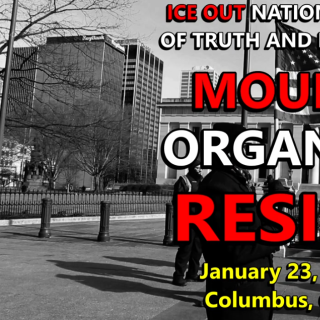We all want the same thing — to live in safety with our families and contribute to our communities. When government policies harm families, the policies should change. And when children are involved, our government should take the greatest care before doing something that changes their lives so irrevocably.
Thia week, President Biden announced a plan to extend work permits to the undocumented spouses of U.S. citizens. This is a long overdue acknowledgment that deportation is an extreme consequence for a paperwork problem, and that the government can enact policies that protect individuals, families, communities, and children. The Ohio Immigrant Alliance celebrates the powerful advocacy by American Families United that led to this moment.
Said Demba B. Ndiath, a community leader and organizer with the Ohio Immigrant Alliance, “President Biden's new immigration policy marks a positive step forward, yet it appears incomplete without addressing the plight of individuals unfairly deported during the Trump era. Many of these individuals, if still in the country today, would likely qualify under the new policy framework. They have established deep roots in the United States, contributing through work and tax payments for over a decade in most cases. Moreover, the emotional toll on families, with U.S. spouses and children left behind due to the harsh Trump-era deportations, underscores the humanitarian imperative for a more inclusive approach. To truly embody fairness and compassion, Biden's administration should consider measures to rectify past injustices and reunite affected families.” Listen to Demba speak at a press conference hosted by the Ohio Immigrant Alliance and Center for Law and Social Policy on Capitol Hill last week.
The Trump administration increased deportations to Africa by 74 percent, focusing on long-term residents, including those with U.S. citizen relatives. They had benefited from prosecutorial discretion under previous administrations, but the Trump administration chose to deport them. Many people involved in the Ohio Immigrant Alliance’s #ReuniteUS campaign, which seeks to expand paths to return for people who were deported, were working legally in the United States, owned homes, and had U.S. citizen spouses and children at the time of their deportation. They want a chance to come home, too.
Goura Ndiaye was deported from Columbus to Mauritania in 2019, forced to leave behind a family that includes two young sons who are U.S. citizens, one of whom has Down Syndrome. In a video for the National Immigrant Justice Center Goura said, “I think deportation like this is a mistake…. They should give people second chances. That’s what I believe…. And I do love America. Whatever happened to me, I’m not gonna say any wrong things to any American people. No. I had a lot of friends. A lot of good neighbors. Never had problems with anybody. I couldn’t believe they were going to deport me. It’s not easy to be in a country for almost twenty years and build your life and one day, it stops. It’s a long way to get experience in another country. To learn English. To go to school at nighttime. To learn. Go to work. Get the experience. And then one day they say stop. You don’t have it any more, you have to leave. The day [ICE] told me that — it was the end of the world for me.” Read more about his experience in “Broken Hope: Deportation and the Road Home” and hear directly from Goura here.
Mustapha Komeh was deported from Columbus to Sierra Leone, also during the Trump administration. He wrote in a WhatsApp message, “I am from Columbus Ohio my family is still there I have 15 yrs old boy and 11yrs old girl only my little girl my daughter we talking now my son is so mad at the whole situation is not talking to me much or her mum all am saying is that my family needs me has much i need them am not asking the u.s government to return me back but is my right to be with my kids helping them with everything i can i didn't do anything wrong. I wanna see my family.”
The Trump administration deported Demba Jobe to The Gambia from Minnesota. His wife, Georgina, is a U.S. citizen. “I’m still in love with my wife. I love my family. I wish to come back and stay with them, and continue the life I was doing with my wife because she needs me. I need her,” he said.
Wrote Georgina,“When I met [my husband], I knew he was my soulmate and now I have been stripped of my husband as well as time with him, and he has been gone for most of our marriage. Help my family get back together, please.” Read more about their experience in “Broken Hope: Deportation and the Road Home” and hear directly from Demba here.
The experiences of people who were deported — despite being married to U.S. citizens — were highlighted during the 2020 Democratic National Convention. Then eleven year‑old Estela Juarez’s video letter to President Trump, which aired on the main stage, was called the “most gutting part” of the Convention’s third night. “My dad thought you [Trump] would protect military families, so he voted for you in 2016, Mr. President. He says he won’t vote for you again after what you did to our family. Instead of protecting us, you tore our world apart.”
Outside of the convention, U.S. citizen Maria Paz Perez called on then-candidate Biden to bring her husband, Brigido, home. “Living like this is physically, emotionally, and financially draining. And it doesn’t have to be this way. There are ways that my husband could return to the U.S. and be with us, if our leaders had the political will to allow it. I want to know if candidate Biden sees my family’s separation too and, if elected, whether he will use his power to bring my husband home,” she said.
Responding to years of leadership from U.S. military veterans, the Biden administration created a centralized program for veterans who were deported to request being allowed to return. “Regardless of where we’re born, we all feel like [our country of deportation] is not our home. This is not our country. Our ties [to the U.S.] are so strong. And our commitment to our country is stronger than where you were born,” said Joaquin “Jack” Aviles, co-director of the Deported Veterans Support House in Tijuana, Mexico.
The veterans policy received the strongest support among all pro-immigrant actions taken by Biden in a poll by the Immigration Hub. Other people who were deported but also built good lives here, and have family members and friends who feel their absence every day, deserve the same opportunity.
Said another member of the #ReuniteUS community, “Our hopes are broken by deportation. It needs patience and determination but we will get back to the U.S., God willing. They have deported our physical bodies but our spirits are still there with our loved ones.”
----------------------------------
Read more about the experiences of people who were deported in “Broke Hope: Deportation and the Road Home,” a book based on 255 interviews conducted by OHIA organizer Maryam Sy. Listen to audio summaries and watch video testimonies from people who were deported, and their loved ones, here.
Hear from fathers whose children have been harmed due to their deportation here and donate to help Ibrahima Keita’s sons travel to visit him here. To learn more about how deportation has harmed children, check out this factsheet from the Children Thrive Action Network.



